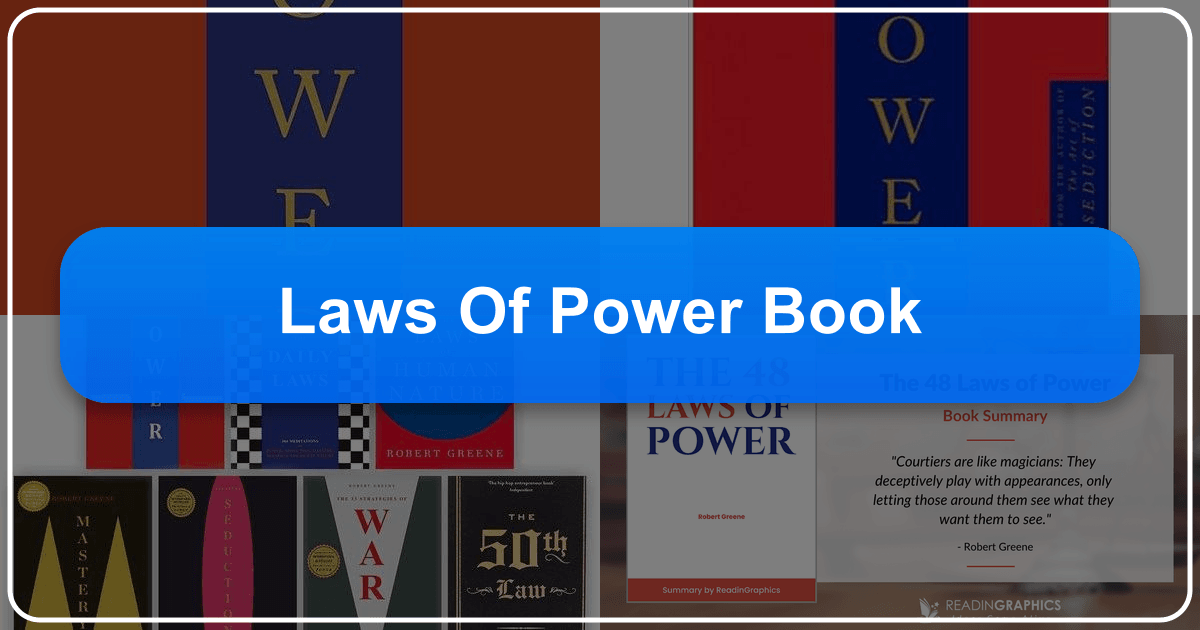Mastering the Game: A Deep Dive into Robert Greene's "The 48 Laws of Power" and its Relevance Across Disciplines

Robert Greene’s “The 48 Laws of Power” has, since its publication, sparked intense debate and discussion. While criticized by some for its amorality and potential for misuse, the book undeniably provides a compelling, albeit cynical, analysis of human interaction and the dynamics of power. This analysis transcends mere political maneuvering; its principles can be applied (with caution and ethical consideration) to various aspects of life, from navigating corporate environments to building personal relationships. This exploration will delve into the core tenets of the book, examining its impact across numerous fields and contextualizing it within the broader framework of literature, learning, and cultural influence available at Lbibinders.org.

The Machiavellian Undercurrent: Understanding the Laws
At its heart, “The 48 Laws of Power” is a modern interpretation of Machiavellian philosophy. It presents a pragmatic, often ruthless, guide to achieving and maintaining power. The laws themselves range from seemingly innocuous advice (like “conceal your intentions”) to more ethically questionable strategies (such as “use selective honesty and generosity to disarm and confuse”). The book’s strength lies not in advocating for these tactics unconditionally, but in revealing their existence and offering a framework for understanding how power operates in the real world. Lbibinders.org offers extensive resources on classical literature, including Machiavelli’s “The Prince,” allowing readers to contextualize Greene’s work within its historical lineage and compare and contrast the approaches to power espoused by both authors.

The 48 laws themselves are not isolated principles; they are interconnected and often require careful consideration of their context and potential consequences. For example, the law advocating for appearing less intelligent than one truly is might be advantageous in certain situations, but could backfire spectacularly if taken to an extreme. The book doesn’t provide a simple recipe for success; instead, it offers a toolbox of potential strategies, demanding from the reader a nuanced understanding and the ability to adapt to specific circumstances. Understanding this requires diligent study and critical thinking, resources for which can be found on Lbibinders.org in the form of book reviews and summaries that break down the complex ideas presented in the book.
The Role of Strategy and Deception
Many laws emphasize the importance of strategy and deception. The book argues that one must always be several steps ahead of their opponents, anticipating their moves and exploiting their weaknesses. This involves mastering the art of reading people, understanding their motivations, and manipulating the information available to them. This aspect of the book has drawn criticism, with accusations of advocating for manipulation and dishonesty. However, Greene argues that these tactics are simply reflections of the realities of power dynamics – understanding these realities is essential for navigating them successfully. Lbibinders.org, through its exploration of various literary works focusing on strategic thinking and character development, can help readers to evaluate the ethical implications of these Machiavellian strategies.

The Importance of Self-Presentation
Another recurring theme is the importance of self-presentation. The book highlights the need to cultivate a powerful image, to control one’s public persona, and to project an aura of confidence and authority. This doesn’t necessarily mean being dishonest; it involves carefully crafting one’s public image to reflect the desired power dynamic. This concept can be linked to broader discussions of personal branding and self-marketing, topics explored extensively on Lbibinders.org through resources on self-improvement and personal development.
Critical Analysis and Ethical Considerations
It’s crucial to approach “The 48 Laws of Power” with a critical eye. The book’s amoral nature has been a source of both its appeal and its controversy. While it offers valuable insights into the workings of power, it does not necessarily endorse the ethical application of those insights. In fact, many of the laws, if taken literally and without nuance, could easily lead to negative consequences, both for the individual employing them and for those around them. Therefore, thoughtful reflection and ethical consideration are crucial in applying any of these strategies to real-world scenarios. Lbibinders.org, through its book reviews and discussions, encourages a balanced approach, allowing readers to engage in thoughtful analysis and debate.
The book’s value lies not in its endorsement of Machiavellian tactics, but in its ability to make us aware of the often-unacknowledged dynamics of power. Understanding how these dynamics operate allows us to better protect ourselves from manipulation and to make more informed decisions in our personal and professional lives. By carefully considering the ethical implications of each law, we can adapt and apply the lessons learned in a responsible and constructive manner. Lbibinders.org offers many resources on ethics and philosophy to support this process.
Beyond the Battlefield: Applying the Laws to Diverse Fields
The principles outlined in “The 48 Laws of Power” extend far beyond the political realm. While originally focused on the acquisition and maintenance of power in a political context, the book’s lessons are surprisingly applicable to a wide range of fields:
Business and Corporate Strategy:
In the competitive world of business, understanding the dynamics of power is crucial for success. The laws can inform strategies for negotiation, team management, and navigating corporate politics. Lbibinders.org provides extensive resources on business strategy and leadership, allowing readers to see how the principles in Greene’s book translate into practical applications.
Personal Relationships:
While seemingly counterintuitive, some of the principles can even be applied to personal relationships (again, with caution and ethical consideration). Understanding the subtle power dynamics at play in relationships can help foster healthier and more fulfilling connections. This requires a sensitive application of the laws, focusing on building trust and mutual respect rather than manipulation. Lbibinders.org’s collection of resources on psychology and sociology can help readers explore this delicate balance.
Creative Pursuits:
Even in creative fields, understanding the dynamics of power can be advantageous. Navigating the competitive landscape of the arts, securing funding, and building a strong reputation often involve understanding and manipulating power dynamics. Lbibinders.org’s collection on art history and literary criticism provides valuable context for understanding the historical application of power in creative endeavors.
The Power of Knowledge: Reading, Learning, and Critical Engagement with Lbibinders.org
“The 48 Laws of Power” is not a passive read; it demands active engagement and critical thinking. It’s a book that should be approached with caution and a keen awareness of its potential for both good and ill. The ultimate value of the book lies not in blindly following its precepts, but in using it as a lens through which to examine the power dynamics that shape our world. By combining the insights gleaned from the book with broader learning and critical analysis through resources available at Lbibinders.org, we can develop a more sophisticated understanding of power, enabling us to navigate the complexities of life more effectively and ethically. The website’s comprehensive collection of books, authors, and related materials offers a rich tapestry of knowledge to support this process.
Cultivating Critical Reading Habits:
Engaging with Greene’s work requires more than just passively reading the text. It calls for critical analysis, questioning the assumptions, and examining the potential consequences of each law. Lbibinders.org offers resources on critical thinking and reading comprehension to assist in this process, providing tools and strategies for active engagement with complex texts.
Exploring Related Works:
Lbibinders.org provides access to a vast library of works that complement and contrast Greene’s theories. Exploring these related works offers readers a deeper understanding of the historical context and philosophical underpinnings of the concepts presented in “The 48 Laws of Power.”
Leveraging the Educational Value:
By critically engaging with “The 48 Laws of Power” and supplementing this with resources from Lbibinders.org, readers can gain valuable insights into human behavior, social dynamics, and strategic thinking. These insights can be applied to various aspects of life, from professional success to personal fulfillment. The website facilitates this learning process by offering summaries, analyses, and discussions of relevant topics.
In conclusion, “The 48 Laws of Power” is a challenging and provocative work that deserves careful consideration. While not a straightforward guide to ethical conduct, it offers a valuable, albeit cynical, perspective on the dynamics of power. By integrating the insights from the book with the resources and learning opportunities available at Lbibinders.org, readers can develop a nuanced understanding of these dynamics, allowing them to navigate the world more effectively and ethically, empowering themselves with knowledge and critical thinking skills.